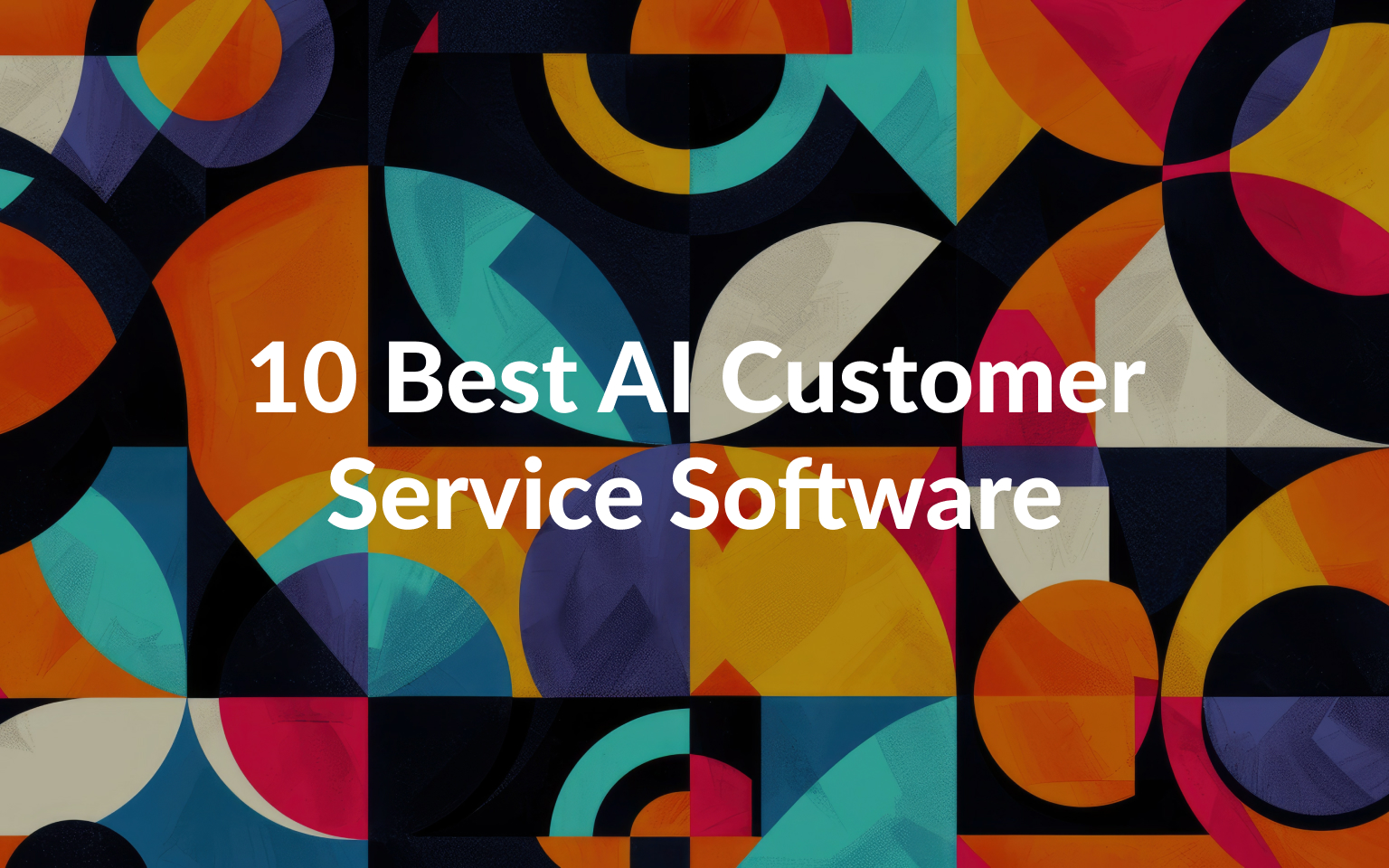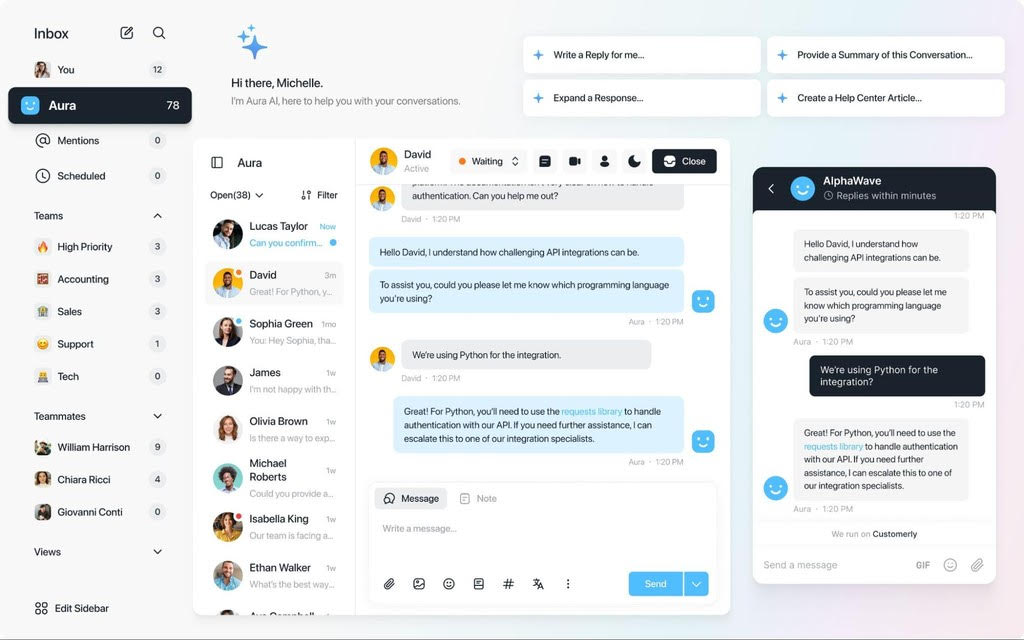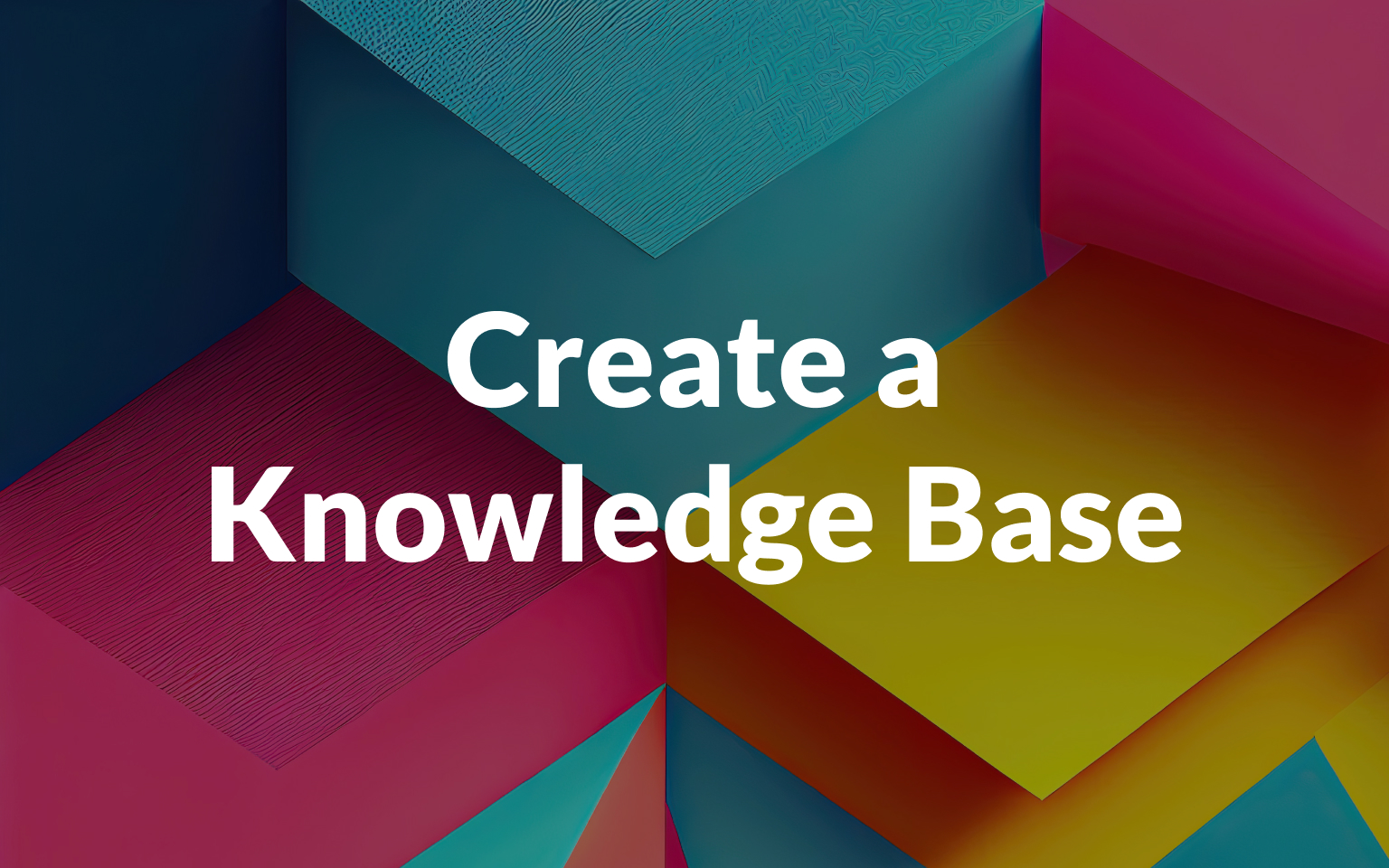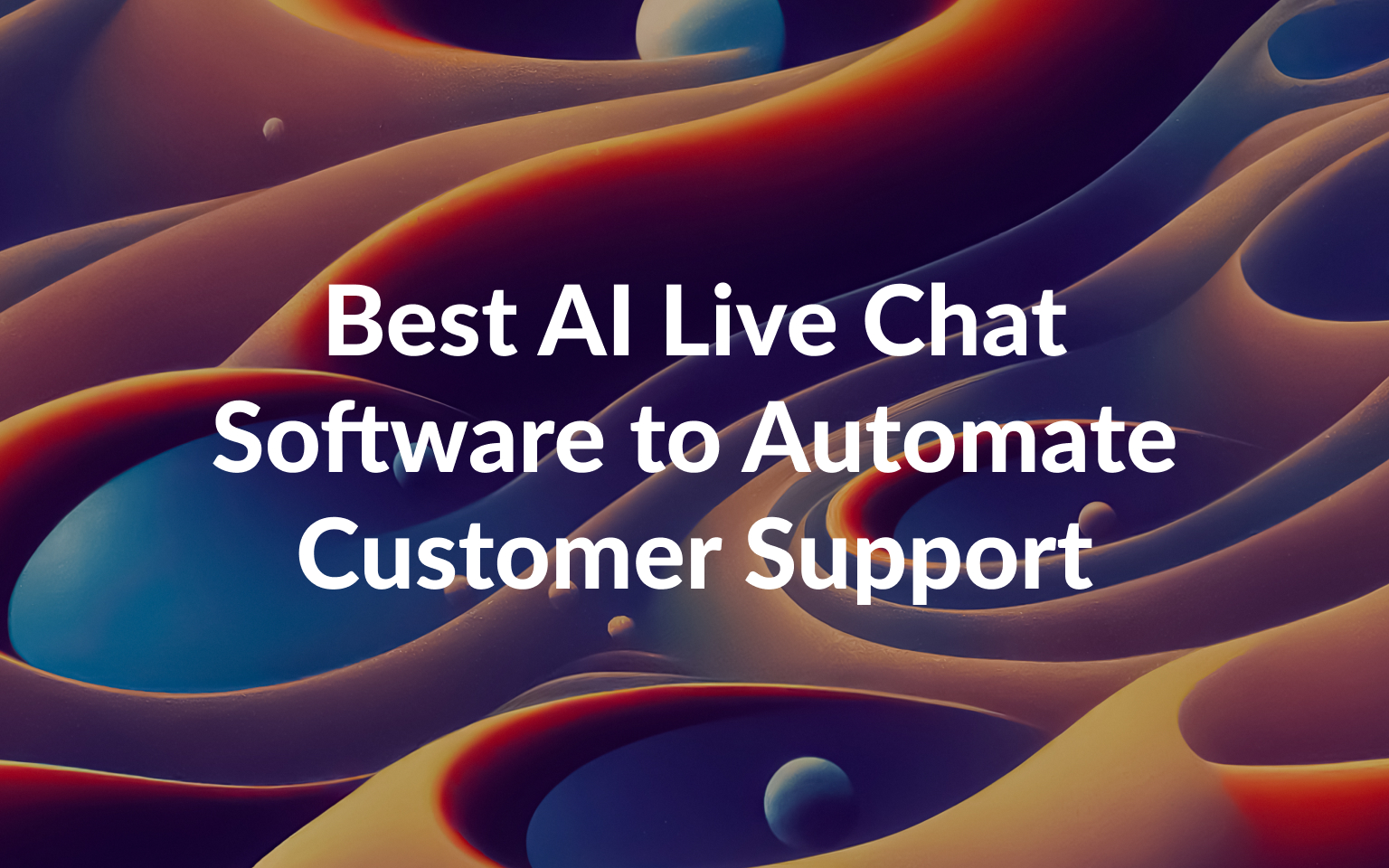

AI for Customer Service: Benefits, Use Cases & Top Software

Customers increasingly demand better, more personalized, and faster service. This leaves businesses scrambling for ways to reduce resolution times without running down or overstaffing human resources.
Think about it; most of your customer service staff have probably seen the same few requests hundreds of times. On the other hand, every customer feels like their situation is unique and that they deserve a personalized response.
This mismatch creates a lot of repetitive, busy work for support staff. However, companies simply can’t risk disappointing their customers with generic, unhelpful chatbot interactions.
The answer: leveraging AI software for customer service to scale your operations, empower your engagements, and improve customer experiences.
In fact, according to Zendesk, 73% of CX leaders believe in the power of AI to create stronger emotional connections with customers.
With that in mind, join us on this deep dive into AI customer service solutions for 2025.
What is AI Customer Service
AI customer service uses AI-powered software to automate, and enhance, customer interactions and support an in-house team.
While many still only think of straightforward chatbots when it comes to AI-powered customer service, this is simply no longer the case.
Today’s solutions use a range of cutting-edge tech, like natural language processing (NLP), large language models (LLMs), machine learning, and natural language understanding (NLU) to boost the speed, efficiency, and personalization of automated support services.
The main goal is to free up customer service staff to focus on the most complex or high-value tickets. At the same time, advanced AI capabilities with a deeper understanding of customer needs and context ensure that you don’t sacrifice quality for efficiency.
How to use AI In Customer Service (examples)
When you mention AI customer service, chatbots are the first thing that pops into most people’s minds. Many still think that that’s all there is to it, but it couldn’t be further from the truth.
It’s actually a diverse field with tools that support customers, service agents, and decision-makers.
In most situations, you’ll want an AI customer service solution that offers a mix of these capabilities. This ensures a comprehensive, yet integrated, support ecosystem where each customer can seek help the way they are most comfortable with.
Conversational AI
Conversational AI has burst onto the scene. Tools like OpenAI’s ChatGPT have completely changed the way we communicate with AI systems.
Advancements in NLU, NLP, and LLMs allow us to ask questions and get answers like we’re talking with another human. This opens the door for anyone to use complex, multi-faceted queries to get results without any special training or expertise.
And, through machine learning, they can continuously evolve to improve live chat capabilities.
As a customer service tool, conversational AI has a range of applications. From enhancing the customer experience in chatbots to providing multi-lingual support to helping agents quickly gather customer data; the possibilities are endless.
AI Chatbot
Unfortunately, the associations aren’t always positive due to a lack of intelligence and personalization in older models.
However, as conversational AI improves, it’s becoming harder to spot the difference between chatbots and human agents.
However, they are still an essential part of any AI customer service toolkit. Customer service chatbots allow the processing high volumes of requests without additional human resources. By offering immediate responses, they reduce wait times and allow agents to focus on more pressing or complex cases.
Today’s chatbots can guide customers through standard processes help with basic troubleshooting, answer FAQs, or recommend products. Where needed, they can redirect to support resources or escalate tickets to human agents.
They are also a convenient way to collect user feedback through surveys or ratings.
Meet Aura – Your AI Customer Service Teammate
Harness Aura’s advanced AI to deliver instant responses, escalate issues, and build stronger customer relationshipsVirtual Assistants
Unlike chatbots, virtual assistants go beyond surface-level interactions. They are designed to handle more complex scenarios that requires back-and-forth interactions with a customer.
For example, a virtual assistant helps customers schedule appointments. This may involve checking availability, accepting multiple suggestions, and handling rescheduling or cancellations automatically. In the background, it may also provide personal reminders and follow-up messages.
AI-powered virtual assistants are useful for service-oriented businesses where customers expect seamless, ongoing support.
Automated Workflows
Many repetitive tasks, like data entry and ticket creation, are already easy to automate. However, AI can streamline operations even further by optimizing automated workflows and providing intelligent ticket routing.
Automated workflows reduce the risk of human error and eliminate unnecessary manual checks and approvals. This reduces the workload for service staff and speeds up the process for customers.
Automatically tagging and prioritizing tasks also make ticket management easier. The system can even automatically assign tickets to the right agent or kick off the appropriate workflow based on keywords, urgency, agent skill, or availability.
AI Writing Assistants
Even when the human touch is needed, AI can help agents communicate more clearly and effectively.
Generative AIs using LLM models are already great at drafting static content, such as knowledge base articles, step-by-step guides, and other helpful resources. However, they are becoming increasingly good at helping agents out in real-time interactions.
For example, AI writing assistants can provide live recommendations to improve a direct response to a customer query. Or, to craft a well-worded email with personalized details.
For all types of content, AI writing assistants can also:
- Restructure texts or change their length
- Editing for tone, style, or technical level
- Translating texts into other languages
Agent Assistants
Thanks to the power of AI, every single customer service agent can have their very own PA.
AI customer service software can collect and organize customer information, giving agents a detailed breakdown at a glance. With all the context they need at their fingertips, agents have less prep work to do and can make sure that they address customer issues directly.
Based on its analysis or operating procedures, the AI can even suggest next actions based on previous interactions or customer sentiment.
AI Sentiment Analysis
Speaking of, understanding a customer’s headspace can provide valuable insight into how to best serve them.
As their ability to understand and decode natural language improves, AIs are also becoming better at reading human emotions and intent. This allows AI to hone in on customer needs, pain points, and levels of urgency.
For example, AI can detect a customer showing a high level of frustration, and give their ticket a higher priority. It can also suggest modifying the tone of the agent’s reply to help put the customer at ease.
By analyzing patterns in customer feedback, AI can make sense of otherwise disparate data, highlighting areas needing attention. This empowers agents to offer better and more empathetic support.
AI Knowledge Base
Unlike many other AI tools, the focus of an AI knowledge base is to help customers quickly find the right information, not to appear human.
It’s possible to integrate your knowledge base with a chatbot, allowing users to prompt the system for information. The chatbot can suggest the most relevant articles or guides, instead of the user having to browse through hundreds of articles or navigate through the documentation manually.

An AI-powered knowledge base can also help out the customer service team by flagging unhelpful content by analyzing customer feedback or actions. Plus, it can save agents’ time by suggesting which articles to share with users based on their conversations.
Conversational Reporting
As important as reporting is to get actionable insights and inform decision-making, it can also take up precious time.
AI-powered reporting tools can automatically analyze and visualize data into easily digestible graphs, charts, or reports. Not only are standard reports available at any time, but agents can query them using natural language prompts to generate custom reports or get key takeaways.
This makes valuable, real-time data available to everyone so they can make faster and more accurate decisions. It may also uncover new opportunities for sales, proactive support, and customer success.
Benefits of Using AI Customer Software Tools
Investing in AI customer service has the potential to totally revolutionize every aspect of how you engage with your customers.
This is clearly important, as businesses that excel at delivering positive customer experience outgrow their market by 4-8%.
By choosing the right solution, you can expect a ton of benefits:
- Free your support teams from up to 50% of repetitive tasks
- Improve accuracy of support responses
- Offer hyper-personalized experiences
- Scale up customer service operations
- Reduce workload and prevent burnout
- Significantly reduced customer waiting times
- Predict and address customer needs proactively
- Gain deeper insights into customer trends
- Visualize and optimize team performance
- Boost conversions and reduce customer churn
- Provide multilingual support effortlessly
- Implement AI-driven quality assurance
- Prioritize requests intelligently
- Expedite chatbot training
- Optimize efficiency and reduce costs
- Build a resilient support infrastructure
Challenges
However, it’s not all smooth sailing.
Like any major change, there are some potential pitfalls you should be aware of.
Don’t get us wrong – the benefits of augmenting your customer service with AI greatly outweigh the cons. However, keeping these challenges in mind will help you avoid any unexpected hiccups:
- Lack of human touch: Modern-day AI systems are getting better and better at understanding and emulating human-like behavior. However, they aren’t perfect just yet. You’ll need to balance using AI to automate interactions while recognizing where it might still fall short. Overusing AI can lead to frustration and leave your customers feeling neglected.
- Additional monitoring and maintenance: While AI can significantly streamline customer service, it does come with its own overhead. Someone needs to be responsible for monitoring, maintaining, and updating the system. This ongoing effort is essential to resolve issues and refine the AI’s performance.
- Resistance to change: Any big change can be scary. This is especially true for AI; not only because it seems complex and mysterious but also because it raises concerns about job security. Make sure that your teams understand why the change is needed and clearly communicate the integration process. Time and patience are the best cure.
- Initial setup: AI has amazing potential to learn and improve over time. However, it needs a foundation of knowledge to begin with. AI customer service software won’t come pre-loaded with your company’s unique product and service knowledge. You’ll need to provide it with some initial training data and monitor its performance to ensure it’s developing in the right way.
- Training and onboarding: AI customer service is somewhat new, and most of your people may not have worked with one before. Like any software, it will take some time to upskill your team and show them how to use it effectively. This can be tricky while managing your typical workload.
How to choose the best AI customer service solution for your business: 10 tips
Every business is unique, and so are its needs and requirements. There’s no point in getting the latest, shiniest AI solution if it doesn’t align with your company’s customer service goals.
Use the following tips as a framework to help you find the best-fit AI customer service solution for your business:
- Determine your pain points, needs, and goals: There may be a specific area of your customer service you want to improve. Usually, the best way to go about this is to ask yourself some questions and look for a platform that provides the answers:
- In what ways do you hope implementing AI will enhance your customer service operations?
- Do you have any specific goals, such as boosting conversations, reducing costs, or avoiding burnout?
- What success metrics do you use? For example, CSAT, NSP, conversion rates, or tickets closed.
- Do you want to reduce the total number of tickets or optimize routing tickets to the correct departments?
- Explore the market and analyze options: Don’t settle for the first AI customer service solution you come across. Compare vendors and do a deep-dive on each one to ensure that they offer what you need in terms of:
- Features
- Integrations
- Compatibility with your technology stack and APIs
- Company/customer service ethos
- Preferred communication channels
- Estimate scalability: Make sure that the solution can support the size and scope of your customer service operations. Does it have the infrastructure to meet the demands of today, with the ability to grow with you in the future? Also, make sure that it can scale dynamically to handle peak load times.
- Analyze customer support and training: Adopting new technologies can be scary, so ensure your vendor is there to support you. Check the extent of their technical support, including onboarding services, training, 24/7 availability, and any SLAs.
- Look for customization and brand-ability: Consistency is key to offering a seamless and smooth support experience. From branding elements to colors to voice and tone; your AI customer service solution should adapt to your identity.
- Check AI accuracy and performance: Not all solutions have the same ability to understand and respond to customer queries. Ask the vendor for its query resolution accuracy, response time metrics, and the system’s ability to learn and improve over time.
- Ensure it offers applicable compliance and governance: Your AI customer service solution should adhere to the same standards, regulations, and guidelines that your company is subject to. Look for ready-to-go compliance with common standards, like GDPR, CCPA, and HIPAA. Plus, built-in auditing tools to track changes and manage user consent.
- Assess the level of data security: The last thing you want to worry about when integrating a new system is that it will expose you to cyber threats. Encrypted data transfer and storage, access control, incident response, and data privacy compliance should come as standard.
- Examine vendor track record: When getting an AI customer service solution, you’re not just buying software but partnering with another company. How long have they been around? What feedback do they get from past customers? How impressive is their customer portfolio? Are they actively developing new features and updates?
- Calculate the total cost: Like any business investment, you must be able to justify the decision based on your budget and expected returns. So, calculate the total cost of ownership, taking into account both immediate and long-term expenses. This includes the acquisition cost, setup, training, and support. Based on your current metrics and the system’s performance, estimate the potential return on investment (ROI) and time to value (TTV). Keeping this in mind, we have catered a comprehensive list of AI customer service software in the next section.
The best AI customer service software to evaluate right now, in 2025
If there was a perfect, one-shoe-fits-all AI customer service solution out there, you wouldn’t be reading this article.
Below, you’ll find AI customer service tools for every need. To help you find the most suitable solution quicker, we’ve ranked them by average cost, from the least to the most expensive. Moreover, almost all of the software has a ‘free trial’ option, ranging from 14 to 30 days.
Here’s a quick look at some of the top AI customer service platforms out there.
Customerly
Customerly is the most AI customer service platform, offering centralized customer support, intelligent and hyper-personalized chatbots, and comprehensive agent support through generative AI and customer analysis.
Customerly’s customer interactions are powered by Aura AI. More than just a simple AI assistant or chatbot, Aura is like having a superpowered customer service teammate. On top of instant and accurate responses, it features intelligent issue escalation in under 30 seconds.
Our platform automates over 50% of support tasks, utilizing smart workflows, engagement triggers, and OpenAI to enhance customer interactions.
Integrating seamlessly with your tech stack, Customerly captures real-time feedback and centralizes CRM, so you can take full control of your customer service processes.
Is it too good to be true? Watch our demo and meet Customerly’ Aura 😉
Key Features:
- Aura AI Assistant: Learns continuously for faster, accurate responses and informed escalations.
- Centralized CRM: View and manage all customer interactions in one place.
- Smart Segmentation: Target and engage the most responsive customers.
- Comprehensive Help Center: Self-help tools and resources for users with an AI-powered knowledgebase.
- Actionable Insights: Real-time feedback and detailed analytics for informed decision-making.
Pricing: Starts at just $9/month with scalable pricing for startups, SMEs, and enterprises (14-day free trial)
Scale Support with Aura AI
Automate inquiries, resolve issues, and delight customers 24/7 with Aura’s AI-powered chat and support toolsZenDesk
ZenDesk has been in the customer service game longer than most. Jumping on the bandwagon, it has also upgraded its extensive suite of tools with AI capabilities.
Centralizing all service interactions and customer history in a unified interface, ZenDesk simplifies managing customer inquiries across your entire team. Leveraging AI, customer queries are categorized and routed to the appropriate departments.
ZenDesk’s Answer bot utilizes machine learning to deliver instant, accurate answers. Many of which is sourced from your knowledge base, community forums, and other resources.
And, as you’d expect, ZenDesk integrates with virtually any back-office business tool, even having its own app marketplace.
Key Features:
- Intelligent triage: Analyzes incoming requests by detecting intent, language, and sentiment.
- Conversational CRM: Offers AI-driven insights and macro suggestions in the Agent Workspace
- AI-defined intents: Improves bot response accuracy and efficiency by assigning specific intents.
- Omnichannel Support: Provides seamless support across multiple messaging platforms.
Pricing: Starts at $19/agent/month for basic ticketing and AI or $55/agent/month for its full suite (14-day free trial)
Help Scout
Help Scout is a communication platform designed for seamless and effective conversations between teams and their customers.
One of its star features is AI Summarize, which provides concise breakdowns of email threads. This allows agents to quickly grasp the context and key points of customer interactions and makes it simpler to hand cases over to other team members.
In the meantime, AI Assist helps to craft polished replies and knowledge base articles, for clear, consistent, and high-quality self-help resources.
Key Features:
- AI Summarize: Provides quick summaries of email threads.
- AI Assist: Helps refine agents’ responses and documentation.
- Seamless transitions: Facilitates smooth handovers between team members.
- Enhanced collaboration: Efficient catch-ups for cross-departmental teamwork.
Pricing: Starts at $22/month with 3 pricing tiers (30-day free trial)
Freshdesk
Styling itself as a comprehensive ticketing solution, Freshdesk support teams with tools to manage tickets, automate workflows, and engage with customers in real time.
Central to Freshdesk’s AI capabilities is Freddy AI. Freddy AI leverages machine learning to learn from past tickets and resolutions, suggesting appropriate responses to new queries and improving resolution times.
Beyond enhancing productivity, Freddy AI provides real-time engagement and self-service options through AI chatbots. By automating actions, like order lookups, it offers instant support via the chat widget.
Key Features:
- Sentiment analysis: Prioritizes and categorizes tickets using sentiment analysis.
- Real-time action: Instant responses and support through AI chatbots.
- Intelligent routing: Automatically assigns tickets to appropriate agents or teams.
- Omnichannel Support: Seamless communication across multiple channels, like WhatsApp, SMS, and social media.
Pricing: Its Customer Service Suite starts at $29/agent/month (14-day free trial)
Tidio
Tidio’s platform combines live chat with various e-commerce integrations for a personalized shopping experience. They key word here is obviously “conversions” and “customer satisfaction,” with Tidio’s bot excelling at sales routing and after-sales support.
On top of handling FAQs, the chatbot can assist customers with checking their order status, shipping times, and more.
Lyro, Tidio’s AI, seamlessly integrates with e-commerce platforms like Shopify and WordPress. Users will have instant access to both customer and order data at any time. It’s also easy to train using in-house data for more tailored results.
Key Features:
- Reply Assistant: Helps agents reply to their messages before hitting send.
- FAQ Wizard: Automatically scrapes question-answer pairs to publish FAQs.
- AI Phrase Matcher: The AI Chatbot will automatically suggest answers by comparing queries to FAQs.
- Customer Intent: Automatically analyzes chat intent and organizes them based on intent categories.
Pricing: Free forever plans but its Customer Service Suite ($29/month) and Lyro AI ($39/month) is priced separately (7-day free trial)
Intercom
Intercom also offers an advanced chatbot called Fin AI, powered by OpenAI’s GPT-4 and its own custom models.
Fin blends natural-sounding responses with fast and accurate answers. Customers can choose between LLM-generated answers or predefined dialogs, depending on their support strategy.
On top of its self-driven optimization, Fin’s responses can be tracked and refined in the inbox. The platform also offers omnichannel support and a brandable, integrated Help Center to support customers in a variety of ways.
Key Features:
- Fin AI Chatbot: Resolves up to 50% of customer queries autonomously.
- Safeguards: Define topics and questions Fin AI avoids answering.
- Fin AI Copilot: Increases agent efficiency by 31% with live chat suggestions.
- Issue triage: Gain insights and route complex requests to the right agent.
- Multilingual capabilities: Supports 43 languages.
Pricing: Starts at $39/seat/month with customizable plans (14-day free trial)
Kustomer
Kustomer IQ, an AI-powered extension of the Kustomer CRM platform, supplements customer service by automating routine tasks and handling straightforward queries. Its AI Co-pilot uses generative AI to help agents with instant communication prompts, boosting efficiency by up to 65%.
The dashboard provides a comprehensive view of customer interactions, making it easier to offer quality support across multiple channels. At the same time, it speeds up ticket resolution and reduces manual work.
With built-in feedback mechanisms and instant updates, customer support teams can ensure they are at the top of their game.
Key Features:
- Chatbot creation: Design and launch advanced chatbot workflows with a visual interface and templates.
- Deflection via self-service: Suggests knowledge base articles to reduce direct queries.
- AI-enabled summaries: Offers agents concise, AI-crafted conversation overviews.
- Customizable Interface: Personalized themes, chat shortcuts, and pre-made email macros.
Pricing: Starts at $89/user/month with two plans (14-day free trial)
Sprinklr
Sprinklr AI+ combines its in-house AI, Google Cloud’s Vertex AI, and OpenAI’s GPT models to deliver a robust and versatile customer service solution. Designed to boost team productivity and decision-making, Sprinklr AI+ claims to provide over 90% accuracy in service delivery.
To make real-time interactions more engaging and effective, Sprinklr AI+ optimizes agent responses for tone, relevance, and accuracy. Like most other AI chatbots, it largely leverages your existing Knowledge Base for the information it provides. To help streamline operations, it can automatically summarize and close some cases.
Finally, Sprinklr AI offers a library with hundreds of AI chatbot templates for different industry vertices.
Key Features:
- Agent Assistance: Optimizes responses and leverages the KB in real-time.
- Conversational AI+ Bots: Hundreds of pre-trained bots ready for deployment across various verticals.
- AI-Driven Quality Insights: Automates quality evaluation and recommends improvements.
- Automatic resolution: Autonomously closes and summarizes tickets to reduce load.
Pricing: Starts at $199/seat/month (30-day free trial)
HubSpot
HubSpot is best known as a comprehensive CRM platform, but also happens to offer AI tools to streamline marketing, sales, and customer service.
ChatSpot, HubSpot’s AI assistant, is built for productivity. It handles tasks like writing social media copy, generating blog topics, and capturing data insights. Powered by OpenAI’s GPT and Dall-E, ChatSpot can even assist with content planning and reporting.
HubSpot’s chatbots provide 24/7 customer support, learning from past interactions to offer tailored responses. AI-backed automation helps create a knowledge base and analyzes customer sentiment and feedback.
Key Features:
- CRM Command Line: Quickly add, delete, or manage contacts using natural language instructions.
- Call recording and transcription:
- AI ticketing: Directs customer issues to the most suitable team or agent.
- Knowledge base automation: Creates a self-service repository from existing content.
Pricing: Feature-limited free version of Chatspot. Full customer service starts at $1,170/month for 5 seats.
Drift
Drift focuses on using the power of AI to boost sales and enhance marketing through natural language chatbots.
Drift AI is trained on over 100 million B2B conversations, providing a solid base for delivering quick and human-like responses.
If you’re looking for an AI customer service tool that supports lead qualification and nurturing, Drift should be on your radar. It delivers insightful peaks into customer intent and motivation, helping companies fine-tune sales and marketing strategies.
Analytics offer valuable data on chatbot performance and customer behavior, too. Plus, it slots seamlessly into most tech stacks with robust customization and integration.
Key Features:
- Conversational AI: Quickly responds to customer inquiries and nurtures leads.
- Lead qualification: Use conversation data to qualify leads and identify top-performing sources.
- Analytics and insights: Analyze chatbot performance and refine customer engagement strategies.
- Language translation: Communicate with customers globally.
Pricing: Starts at $2,500/month (no free trial)
Ready for your free introduction Customerly Aura, the best AI chatbot for customer service?
Future trends in AI customer service software
Across the board, AI is here to stay. And, the customer service industry is no exception.
Generative AI in customer service is already a $482.72 million dollar industry and is expected to grow to nearly $3 billion by 2032.
According to Forrester’s, 67% of decision-makers say they plan to invest more in AI in the coming years.
The math is simple: if you’re not investing in AI to boost your customer service, you’re falling behind.
One of the defining features of AI is its ability to continuously adapt and evolve. This means that most AI customer service solutions will only get better with time. As models improve, chatbots will deliver increasingly human-like interactions and require less time and data to train.
This means they’ll be able to cover more support interactions with less oversight and human intervention.
What are you waiting for? The future is here!
AI is changing everything. Smart automation, personalized support, and less stress for your team. It’s time to try Customerly.Static knowledge bases that require humans to continuously fact-check and edit will also disappear.
Dynamic, AI-powered documentation will become the norm, automatically creating new articles, suggesting content (to customers and agents), and updating outdated info as the need arises.
Just a couple of years ago, all of this would sound like something out of the future. However, it’s already becoming a reality for many customer-facing businesses.
If you’re ready to step into the future, today, sign up for a 14-day free trial and try out Customerly for yourself. See what the future of customer service looks like, and get a headstart on taking yours to the next level.
How does AI in customer service work?
AI uses algorithms and machine learning to automate and personalize customer service responses.
Natural language processing (NLP), natural language understanding (NLU) work through large language models (LLMs) to interpret customers and respond to them intelligently.
For example, chatbots simulate human interactions to handle customer inquiries in real time. Predictive analytics analyze data patterns to forecast behavior and tailor services.
In the background, automated ticketing systems streamline operations by categorizing, prioritizing, and assigning tickets efficiently.
How is AI software used for customer service?
Businesses use AI solutions to both boost customer satisfaction and improve their own efficiency.
For example, AI can analyze customer sentiment and intent, providing agents with recommending courses of action. Chatbots can automatically answer FAQs and provide basic support, reducing the ticket load.
Generative AI can even create new canned responses, knowledgebase articles, support emails, or suggest improvements to agent replies in real-time.
What companies use AI for customer service?
Anyone and everyone!
If you’re a company and you provide customer service, chances are you can benefit from integrating AI.
Many leading companies leverage AI to enhance their customer service.
Here are just a few examples to get you inspired:
Amazon’s AI chatbots assist customers with order tracking and inquiries.
Macy’s is piloting AI chatbots to help customers find products and check stock availability.
Bank of America’s virtual financial AI assistant, Erica, provides advice on spending, saving, and planning finances with a ChatGTP-like interface
H&M, Sephora, and Victoria’s Secret have launched AI shopping assistants via messaging app Kik.
Can AI replace customer service?
Yes and no. While AI has come a long way, there are still occasions when you need that human touch. It all depends on the type of customer support request and the complexity of the case.
What AI is really good at is automating basic tasks that just eat up your agents’ time and energy.
But No, AI is still not capable of replacing customer service completely. Why?
‘Cause even if you manage to solve 90% of the support requests with fully automated AI, 10% must be analyzed and processed by humans.
As the technology matures, it’s also becoming increasingly good at empowering reps with insights and recommendations to improve their service.
Finally, humans still need to oversee AI’s work, monitor changes in customer satisfaction, and devise their overall customer service strategy.





